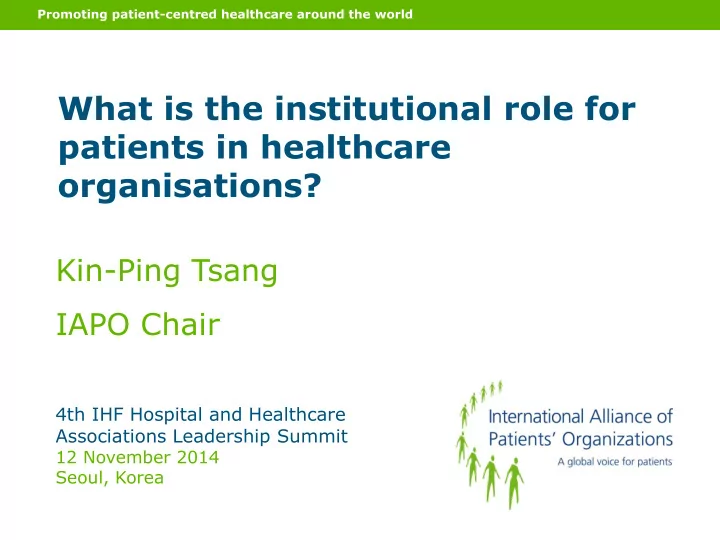

Promoting patient-centred healthcare around the world What is the institutional role for patients in healthcare organisations? Kin-Ping Tsang IAPO Chair 4th IHF Hospital and Healthcare Associations Leadership Summit 12 November 2014 Seoul, Korea
Promoting patient-centred healthcare around the world Contents • A short introduction to the International Alliance of Patients ’ Organizations ( IAPO) • The problem: failing health systems and a lack of institutional patient involvement • The solution: better patient engagement for better health systems • Recommendations to achieve this • Examples of institutional patient engagement • Conclusion
Promoting patient-centred healthcare around the world About IAPO • Unique global alliance of over 240 Capacity Building national, regional and international groups representing patients • Crossing borders and diseases • Membership spans over 65 countries Advocacy and all world regions • Representing an estimated 365 million patients Partnerships
Promoting patient-centred healthcare around the world Promoting patient-centred healthcare around the world IAPO’s mission Our mission is to help build patient-centred healthcare in every country by: • Partnerships with and supporting patients’ organizations • Bringing a strong patient voice to international health policy decision-making • Building cross-sector alliances and working collaboratively with others
Promoting patient-centred healthcare around the world The problem Healthcare systems are under threat 1. The global economic crisis and cuts across healthcare 2. The aging population 3. The increase in non-communicable diseases : 38 million deaths every year. These present a growing economic, social and personal challenge for individuals, communities and countries.
Promoting patient-centred healthcare around the world The solution Patient-centred care institutional patient involvement • Re-focus and place patients in the centre of healthcare • Strengthen institutional and personal patient involvement at every level. • WHO, Alma Ata Declaration, Principle IV, 1978: “ The people have the right and duty to participate individually and collectively in the planning and implementation of their healthcare ”
Promoting patient-centred healthcare around the world What is patient-centred healthcare? A healthcare system which is designed and delivered so that it can answer the needs of patients Patient-Centred Healthcare Principles 1. Respect and support for the individual patient, their wants, preferences, values, needs and rights 2. Choice and empowerment 3. Patient engagement in health policy 4. Access and support 5. Information that is accurate, relevant and comprehensive http://iapo.org.uk/patient-centred-healthcare-resources
Promoting patient-centred healthcare around the world Why patient-centred healthcare? Many benefits including: • Patient quality of life • Improved physiological measures • Increased efficiency in use of healthcare services
Promoting patient-centred healthcare around the world Where should patient-centred healthcare take place? • Individual level, e.g. self management • Institutional level, e.g. systematic feedback, patients on boards and committees • National level, e.g. governments encouraging patient involvement in health policy
Promoting patient-centred healthcare around the world How can patient-centred healthcare happen? 1. A shift in mindset “ The essence of care is to centre on the patient. This is a shift from traditional, provider focused practice, and it requires the workforce to develop communication skills that empower patients through seeing health from the patient’s perspective, and motivating and training patients in health- related self management.” Preparing a Health Care Workforce for the 21st Century: The Challenge of Chronic Conditions (WHO 2005)
Promoting patient-centred healthcare around the world How can patient-centred healthcare happen? 2. Practical details • Mechanisms which ensure that patient views are acted upon • Involvement at all stages from initiation • Practical and educational support and training • Reach underrepresented groups IAPO’s Guidelines on Patient Involvement available at: http://iapo.org.uk/patient-involvement
Promoting patient-centred healthcare around the world How can patient-centred healthcare happen? IAPO’s Guidelines for Patient Engagement 1. Identify issue and set out the objectives 2. Identify appropriate patient representatives 3. Encourage participation and motivate 4. Determine appropriate methods of involvement 5. Give support to enable involvement 6. Provide information, education and training 7. Monitor the involvement – ensure that it makes a difference 8. Evaluate the project 9. Recognize involvement 10. Reassess internal frameworks 11. Educate staff http://iapo.org.uk/patient-involvement
Promoting patient-centred healthcare around the world Example 1: Institutional Patient Involvement in Hong Kong • Hong Kong Alliance of Patients’ Organizations • Patient Ambassador training • Improving patient experience
Promoting patient-centred healthcare around the world Example 2: Institutional Patient Involvement in South Africa • South African Depression and Anxiety Group (SADAG) and Helen Joseph Hospital, Johannesburg • Reminder and Support Adherence Programme • Medical adherence rate rose from 15.8% to 88.6% http://iapo.org.uk/patient-engagement-hospitals
Promoting patient-centred healthcare around the world Conclusions • Re-think and restore patients to the centre of healthcare • Strengthen personal and institutional patient involvement at every level • Review methods of patient involvement and check against these guidelines.
Recommend
More recommend